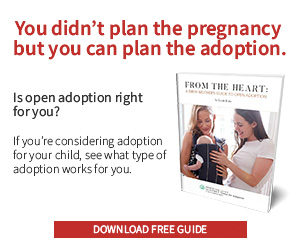One of the most important hot points for adoption right now is post-placement care. Post-placement care is essential to a birth mother’s mental health and to her future success in life. You hear the horror stories of adoptions feeling transactional. Hanging in the balance of this business deal is a birth mother trying to cope with her decision, figuring out life after her decision, and dealing with the grief that lies ahead of her. The decision to place a child carries heavy emotion, indescribable loss, and brokenness. The harsh realities of adoption for some are beginning to be discussed and awareness is finally coming to light.
A couple of weeks ago, I had a wonderful opportunity to sit down with a member of the adoption triad and get a birth mother’s perspective of post-placement care from birth mother Jess Nelson. She is not just any birth mother. She is a sweet friend and now a driving force for change as an adoption assistant with an adoption attorney in Baton Rouge, Louisiana. It is the very same adoption attorney I used for my daughter’s adoption in 2018. This brave and courageous woman took the pain and struggle of her own life, her own adoption story, and is now using it to change the face of adoption in the capital city of Louisiana.
I asked my friend Jess to break down her thoughts on post-placement care, how important it is, what should be standard post-placement care operations for agencies and adoption attorneys, exciting legislation that is in the works, one of a kind adoption professional training, who’s shaking things up in the adoption world, and her adoption foundation’s fresh mission that is near and dear to her heart.
There was so much goodness in our meet and greet, but I’ve outlined the most important points that I found interesting.
Continual Contact between Adoption Professional and Birth mother Post-Placement
More times than not, birth mothers surrender their rights and after that hard and heavy day, they are left with the grief over their decision and the roller coaster of emotions without the tools or the support to unpack it all. They are sometimes completely alone. Adoption professionals may not have the tools themselves to extend a helping hand during this difficult period. There seems to be a hole in the process where additional training and services need to be available so that the birth mothers are able to find the right track to success. Whether it’s an agency or an adoption attorney, contact with the birth mother post-placement is vital for the mental health and well being of the birth mother. Feeling like it isn’t just a business transaction is important to them. This is their life.
Words matter: a phone call, a text, a visit, a check-in, follow-up, a card saying we’re thinking of you/praying for you, a special gift on Mother’s Day, or a message on Christmas show a birth mother she is loved, cared for, and valued. In Jess’s line of work and through her own poor experience after her first placement through an agency, Jess has seen all too often birth mothers falling by the wayside because there wasn’t a plan in place to catch them when they were down. They didn’t feel there was a pamphlet with grief information, no hotline for them to call, no counseling sessions in place, no check-ins, follow-ups, or thoughtful notes sent. Only silence.
After placing her child for adoption, Jess knew she wanted to be a part of the change and so she started working in the adoption world pursuing a more proactive approach to birth mother post-placement care. Her one-on-one work with the birth mothers allows her to forge a bond with them. Because she has been in their shoes, she is able to relate and she knows their heartache because she has had that same heartache in her own life. She also understands the real work begins after placement for these women. As a birth mother, it is sometimes hard to reach out for help. It is up to the adoption professionals to provide support information and/or extend a hand or an ear to start the healing process for the birth mother after the placement has occurred.
Finding a Grief Counselor
One of the biggest suggestions Jess had for birth mothers in the throes of post-placement was rather than seeking a normal counselor or therapist, find yourself a grief or trauma counselor or therapist. Adoption is beautiful but at the same time for a birth mother, it is an immense loss. And it’s not the same type of grief when you lose your elderly grandmother. Your loved one is living, breathing, growing, and thriving with someone else. For anyone that has lost a loved one, you may understand the ups and downs of grief. For a birth mother that has placed her child, the emotional roller coaster of her grief is even greater because day in and day out her child isn’t with her but is continuing to thrive in life. It is a very complex process to unpack all of the layers of emotions and baggage, so finding the right professional to help the birth mother is vital to the path of healing and success in the future.
One of the wonderful aspects of Jess’s position as an Adoption Assistant is working with birth moms to set up counseling with one of the local counseling services in Baton Rouge, Louisiana. This counseling is free of charge to birth moms and it is the kind of services they need. Although they may have access to mental help through Medicaid, it’s not exactly designed to help with birth moms post-placement. Birth moms are required by law to complete two counseling sessions pre-placement, but now they are also offering free counseling post-placement because they believe in it and are passionate about it.
The Importance of Support Groups
Aside from lining up proper support for birth mothers post-placement in the form of counseling or therapy, Jess and her adoption attorney office recently received training from Ashley Mitchell of Big Tough Girl who founded Lifetime Healing Foundation. Ashley created the nation’s first and only post-placement care curriculum for birth moms through her foundation and is now working with adoption professionals training them on the importance of post-placement care and equipping them with the tools necessary to provide birth mothers with the best chance at success in their lives going forward after placement of their child. Along with this curriculum, they also offer a free monthly birth mom support group. At this time, Jess’s adoption attorney office is the only adoption professional in Louisiana with this training and now offers this free monthly support group to local birth mothers. Because professional counseling is of the utmost importance, a licensed professional is present at the group meetings as well. Hopefully, in time, other adoption professionals in Louisiana and across the country will hop on the bandwagon as Jess believes these types of programs are the foundation for a birth mother’s healing and success.
Being a birth mom herself and also navigating her own healing journey through counseling, Jess understands the importance of proper support post-placement. When hosting the first birth mom support group in Baton Rouge, Louisiana, it gave her chills to witness other local birth moms share their hearts, hurts, and desires. Within an inner circle of a support group, the walls start to break down and the core emotions begin to surface. This allows the birth moms to be uplifted and encouraged by other birth moms around them. For anyone that has walked through a trial or struggle, you may understand the power and the bond that is formed in the confines of a support group. You are forever bonded by your shared hurts and hearts. It truly is the most sacred space.
What is unique about this post-placement curriculum and the monthly support group is that it isn’t just a meeting with open discussion. There is a time for that but it is structured with different topics each month. This guides the birth moms in working through different phases of their journey. One month may be about grief, the next about boundaries or relationships, etc. Each topic touches upon a pivotal component of the healing process.
If you aren’t aware of any birth mother support groups in your area or aren’t in the Baton Rouge, LA area, there are online forums that can provide immense support and community to birth mothers. Check them out here. Another great resource to see if there are any special local birth mother events in your area is BraveLove’s birth mother community. It is one of a kind and they post events and additional resources for birth mothers.
Legislation in the Works
One of the most exciting recent developments in regards to post-placement care that has the adoption world all in a buzz is HR3690, the Improving Adoption Outcomes and Affordability Act which was spearheaded by Family to Family Support Network and introduced in the house by Congressman Smucker (R-PA) and co-sponsored by Congressman Phillips (D-MN) and Congresswoman Shalala (D-FL). This simple and straight-to-the-point bill will require counseling (individual, mental health, and substance abuse) to be provided for women that are in the hospital with an adoption plan. These services will also require information to be provided to birth moms regarding post-adoption services and benefits, including those provided by States and local governments. In addition, hospital staff and other related birth care facilities in which staff interact with birth mothers and adoptive families will receive proper adoption training. Through the Secretary of Human and Health Services, this bill is pushing for federal funding to make these benefits and requirements available for everyone.
Pregnant and considering adoption?
Get your free adoption benefits and support bundle

This legislation will be introduced in next year’s sessions and hopefully will be an incredible starting point in providing neutral post-placement care. As a birth mother, Jess knows firsthand how heavy placing a child for adoption is and the weight of carrying that burden is on your shoulders long after placement. She believes in this bill and what it means for birth mother post-placement care. The key component in this legislation is the fact that it isn’t being provided by an adoption professional that may just want you to sign on the dotted line or others attempting to sway an adoption decision one way or the other. The post-placement care and the adoption education will be from a neutral source and will provide the support that is needed throughout the process.
The Red Thread Foundation – Louisiana
Because her passion and heart rests with birth moms, Jess founded The Red Thread Foundation earlier this year as a way to support birth moms post-placement. So often, women still struggle financially, mentally, and emotionally after the six-week post-placement financial help from adoptive parents has ended. Jess wanted to be able to close that gap by offering affordable and usually free mental health care. Additionally, they receive resources to help with addictions, information about a scholarship for women wanting to go back to school, and/or gas and grocery cards when they need it.
The main goal for 2021 is to lease a 2 bedroom apartment for expectant moms that don’t have anywhere to go and don’t have any rental, credit, or job history to qualify for an apartment on their own. The foundation’s mission statement is dedicated to supporting birth mothers throughout their adoption journey and providing them with resources and support post-placement to continue to reach their personal, professional, and educational goals.
Suggestions for Adoptive Parents
Because open or semi-open adoption is pretty commonplace these days, adoptive parents usually have the option for one on one contact with their child’s birth mother. Over the years, Jess has witnessed a variety of instances where the relationships are wonderful and cohesive but she has also witnessed things go south pretty quickly. Whether it’s grievances by the birth mother or by the adoptive parents so many different things can go wrong, cause hurt feelings, or just fall by the wayside. One big suggestion Jess gave me for adoptive parents that may be facing an issue with their child’s birth mother was not to be afraid to reach out to their adoption professional (adoption attorney or adoption agency).
Typically both the birth parents and adoptive parents voice their desires regarding contact post-placement and sign Continuing Contact Agreements. These agreements are not legally binding but it is a way to set expectations for the post-placement future. This helps hold the parties accountable and allows the parties to document their wants and needs in the relationship going forward. If it goes beyond the documented relationship, great. If people aren’t following through on their end of the bargain, the adoption professional can be a mediator to help get everyone back on track. Sometimes it is something as simple as a message being taken out of context or a misunderstanding that can be easily talked through between the parties. Never hesitate to reach out to the professional that walked you through the early days of your journey. Their experience in the field can help bring a fresh perspective.
Hopefully, this birth mother’s perspective highlighted some interesting areas and enlightened you in regards to post-placement care for birth mothers. Adoption has come a long way and the processes continue to improve. Adoption has a bright future ahead.
Are you considering adoption and want to give your child the best life possible? Let us help you find an adoptive family that you love. Visit Adoption.org or call 1-800-ADOPT-98.


